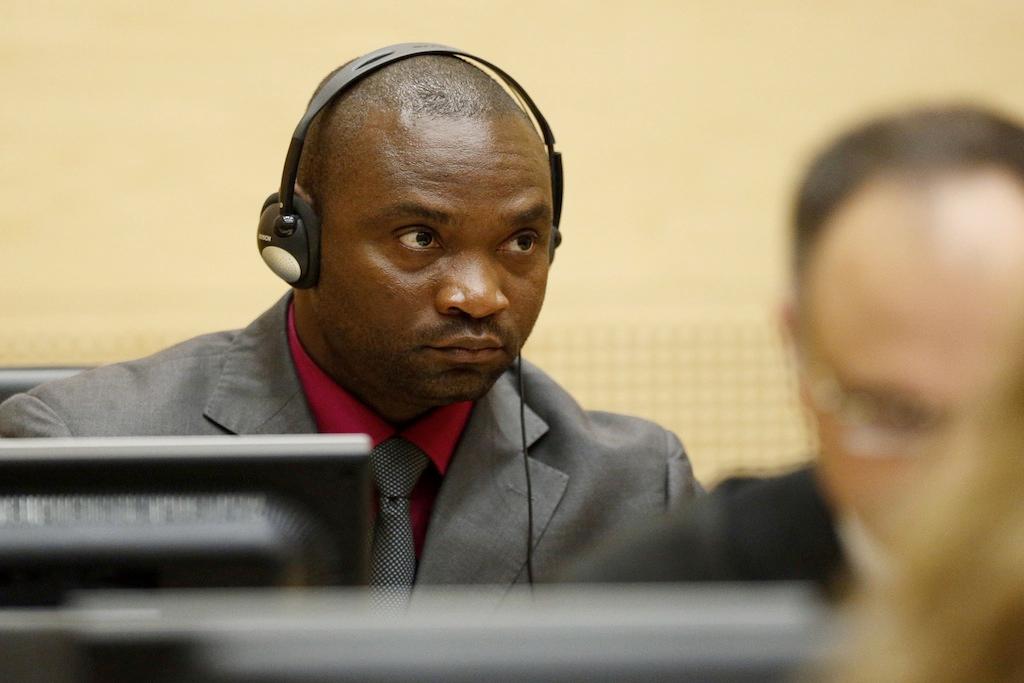ICC conviction of former Congo rebel commander is a missed opportunity
In this picture taken on May 15, 2012 Congolese national and former militia chief Germain Katanga looks on during the closing statements in his and fellow former militia chief Mathieu Ngudjolo Chui’s trial, at the International Criminal Court (ICC) in The Hague. Former Congolese militia chiefs Mathieu Ngudjolo Chui and Germain Katanga claimed they were innocent of war crimes and crimes against humanity at the International Criminal Court (ICC) in The Hague on May 23, 2012.
WASHINGTON — The judgment against Congolese former rebel commander Germain Katanga marked a milestone for the International Criminal Court (ICC).
For the first time in its 12 years, the court ruled on charges of sexual violence, although the result was disappointing, barely a whimper.
The ICC found Katanga guilty of crimes against humanity and war crimes including murder and pillage in the eastern Congolese village of Bogoro. It acquitted him on all charges of rape and sexual slavery.
Katanga’s conviction is an important step toward greater accountability for mass atrocity. But his acquittal of rape and sexual slavery reinforces a long-standing gap in international criminal justice and signals a hard truth that extends beyond what happened in Bogoro: the court is failing to adequately address sexual and gender-based crimes.
Sexual and gender-based violence in armed conflict is a global epidemic. Widespread impunity has allowed it to continue. Rebel and army commanders use systematic rape and sexual enslavement as a military strategy to instill fear, rupture social networks and establish control.
The impact of these crimes causes ripple effects that extend beyond the battlefield and include trauma, displacement and life-threatening disease.
The ICC found that rape and sexual slavery were part of the brutal Bogoro attacks. In their ruling, the court said the attacks even rose to the level of war crimes and crimes against humanity. The court could not find Katanga responsible, however, because prosecutors were unable to show that these particular acts of brutality were tied to the criminal purpose driving the attack.
Prosecuting sexual violence as a war crime is uniquely challenging and requires targeted expertise and funding. Physical evidence of rape is difficult to obtain for rape cases anywhere. In a context like eastern Congo, bereft of adequate health facilities where data can be collected, it is nearly impossible.
Moreover, survivors and witnesses face reprisal attacks and severe stigma for testifying or even sharing information with investigators. Yet their testimony and cooperation is often the lynchpin of a successful case.
If survivors and witnesses are afraid to testify or harmed for doing so, the strength of evidence will suffer.
Dropped charges and acquittals for sexual violence will go on, entrenching the taboo and invisibility that surrounds and perpetuates these crimes.
Investigators and prosecutors need more sophisticated protections in remaining anonymous, gender-sensitive investigation and deposition training, and funding for better relocation and emergency medical care for survivors who assist investigations.
The court also needs to add staff with expertise in sexual violence-related trauma, rights-based protective measures and investigating sexual violence perpetrated by organized criminal networks.
The ICC’s chief prosecutor, Fatou Bensouda, has recently increased her commitment to improving the court’s approach to sexual and gender-based violence. Her office is currently drafting new policies to strengthen sexual violence investigations and prosecutions.
But the court is only as strong as the commitment of its member states.
Bensouda needs the finances, experts and political support necessary to refine and implement her new plan.
Member states should encourage the new initiative and contribute earmarked support to the court to provide the staff, training, and equipment necessary to execute it.
The United States must also support the court’s renewed approach. Despite its failure to join the ICC, the US has found ways in recent years to improve the court’s arrest strategies and it should do the same to advance sexual violence prosecutions.
The State Department recently extended its “Rewards for Justice” program to certain ICC indictments, offering to pay up to five million dollars in exchange for information leading to the arrest of some of the ICC’s most wanted.
It has dispatched military advisors and equipment to assist the Ugandan army and African Union forces find and apprehend Joseph Kony, who was under indictment by the ICC.
The Obama administration should show the same commitment to prosecuting sexual violence in armed conflict as it does to arresting war criminals. It can do so by helping the court improve investigation equipment, protection measures, training, and cooperation with host governments to end impunity for rape and other gender-based crimes.
Trials like Katanga’s deliver a robust measure of justice to victims and remind the world’s worst criminals that their day of judgment looms large. But without high-level convictions for sexual violence in armed conflict, rape and sexual slavery will continue, leaving destructive legacies of psychological trauma, fractured communities and fear.
With the support of the international community, the court should address the issue with urgency and sophistication, never again casting sexual violence off as a side effect of war.
Holly Dranginis is a policy associate at the Enough Project, an organization that fights to end genocide and crimes against humanity, focused on areas where some of the world’s worst atrocities occur.
Every day, reporters and producers at The World are hard at work bringing you human-centered news from across the globe. But we can’t do it without you. We need your support to ensure we can continue this work for another year.
Make a gift today, and you’ll help us unlock a matching gift of $67,000!
